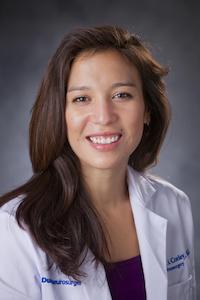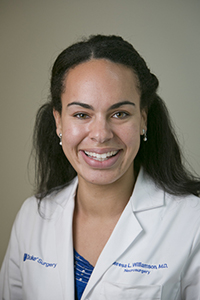

Recent data suggests that the number of women entering the field of neurosurgery is sharply increasing. This is a stark contrast to the not-so-distant past, when the number of women neurosurgeons was so small, it was described as “less than a minority.”
Duke Neurosurgery residents Jackie Corley, MD, (above left) and Theresa Williamson, MD, (above right) recently published a paper in the journal World Neurosurgery entitled “Women in neurosurgery: A final frontier of the career women’s movement.” Here, Drs. Corley and Williamson talk about their article, the changing landscape, and their own experiences as neurosurgeons and mentors.
The title of your article refers to women in neurosurgery as the “final frontier of the career women’s movement.” Why?
Theresa Williamson: I feel like neurosurgery is late to the game when it comes to diversity. In the past, there were not even enough women in the field to make minority status – so there were not enough to make a movement. Yet, when I talk to women in neurosurgery I am inspired.
Jackie Corley: I compared our experiences in neurosurgery with people we know in other areas of medicine. At Duke there are so many women, but before, in med school and on interviews, I often looked around and saw I was the only one.
Why, historically, have women in medicine stayed away from neurosurgery?
JC: I think a lot of it has to do with lifestyle and culture. Historically, surgical fields have not been amenable to having kids and raising families.
TW: I agree that a lot of it is cultural. One thing I find very interesting is that general surgery is growing the number of women much faster than neurosurgery. So there’s something about the culture beyond the work hours. Lots of people tried to talk me out of neurosurgery. They said “You’re too nice, you like having your life too much, you don’t understand what it will be like.”
Why is the number of women in neurosurgery now increasing?
TW: The number of women in medical school is going up. Part of it is that there are starting to be women in leadership roles and they are doing a better job of recruiting and mentoring. And the group Women in Neurosurgery actually helps women get mentors if there aren’t any where they are. Also, there seems to be some pressure [on residency programs] to change. Some places have historically had a bad reputation, and even those places are starting to take more women.
You mention patients mistaking you for a nurse, a pharmacist, or anything but their doctor. How common is this?
JC: It is a daily occurrence, and not just among patients. We do have the sense we have to justify our presence. We have to prove to patients we are the doctor by wearing the white coat, a badge, etc. It happened just yesterday.
TW: When I tell someone I’m a doctor, in their head it is so hard to reconcile. They’ll say, “Oh, you mean a pharmacist?” The other day I had a patient try to order a sandwich from me.
In your article you mention Imposter Syndrome. Do you believe this to be uniquely feminine?
TW: There’s social and psychological data that says that men and women both feel it but in different ways, and they have different responses. I think that some women express it more. They tend to be much more open about their own insecurities if they don’t feel competent. But in fact, it may make them better doctors; there’s data to say outcomes are better with women physicians versus men.
JC: Men and women both experience Imposter Syndrome, but women are more susceptible because they constantly have to justify that yes, they are the doctor. And it’s easy to fall into feeling insecure.
Who were your female role models?
JC: My mom, sisters, and aunts were strong career women who were also committed to family.
TW: Growing up, my role model was my aunt who was a special needs teacher. I wanted to be her because she was so dedicated to her job. When I came into medicine, I was matched with Dr. Anees Chagpar, a surgeon at Yale, through a mentoring program. She went above and beyond to make sure I that I did not stray from being a surgeon. She likes to say, “Suck all the marrow out of life” and encouraged me to take full advantage of all of the opportunities in medical school. Here at Duke Dr. Carrie Muh is an awesome advocate.
How important is it for you to be a mentor?
TW: It is the most important thing. It brings me so much joy. I go out of my way to be over the top as a cheerleader— You can do it! You’re the best in this room! Everyone likes to be encouraged by someone who looks like them. But I also think as a mentor it’s important not to appear as a superhero and to show that we have partners and normal lives and are happy. You don’t have to be standing on a mountaintop by yourself to get where you want to be.
JC: Mentoring is huge and I love to do it. I wish I had someone early on, through medical school and applying for residency.
What do you make of the “Me too” movement?
JC: I think it’s a response to cultural issues in the past. We’ve reached critical mass and are able to use our voice. [In neurosurgery] I think it is a snowball, because there are more published articles, more applicants every year. It just gets bigger and bigger.
TW: I remember when I went to interview at one program and they said would never take more than one woman per class year because it would be weird. I couldn’t believe that they would use blatant discrimination, but I also remember thinking that I could not speak up because I wanted a job. Women that came before us and were brave said this is not right, and they are making us think about the accepted norms.
Neurosurgery is still 83 percent male. What can male neurosurgeons do to affect change?
TW: We have a lot of great examples here at Duke. For example, Dr. Allan Friedman’s wife is Dr. Elizabeth Bullitt, who was the first woman to graduate from surgical residency at Duke, and the first female neurosurgeon on staff at UNC as well as the chair. Dr. Friedman and others like him are so good at advocating for women and would be the first one to correct a patient who doesn’t recognize us as their doctor. He recognizes that the best applicants are here at Duke, regardless of gender.